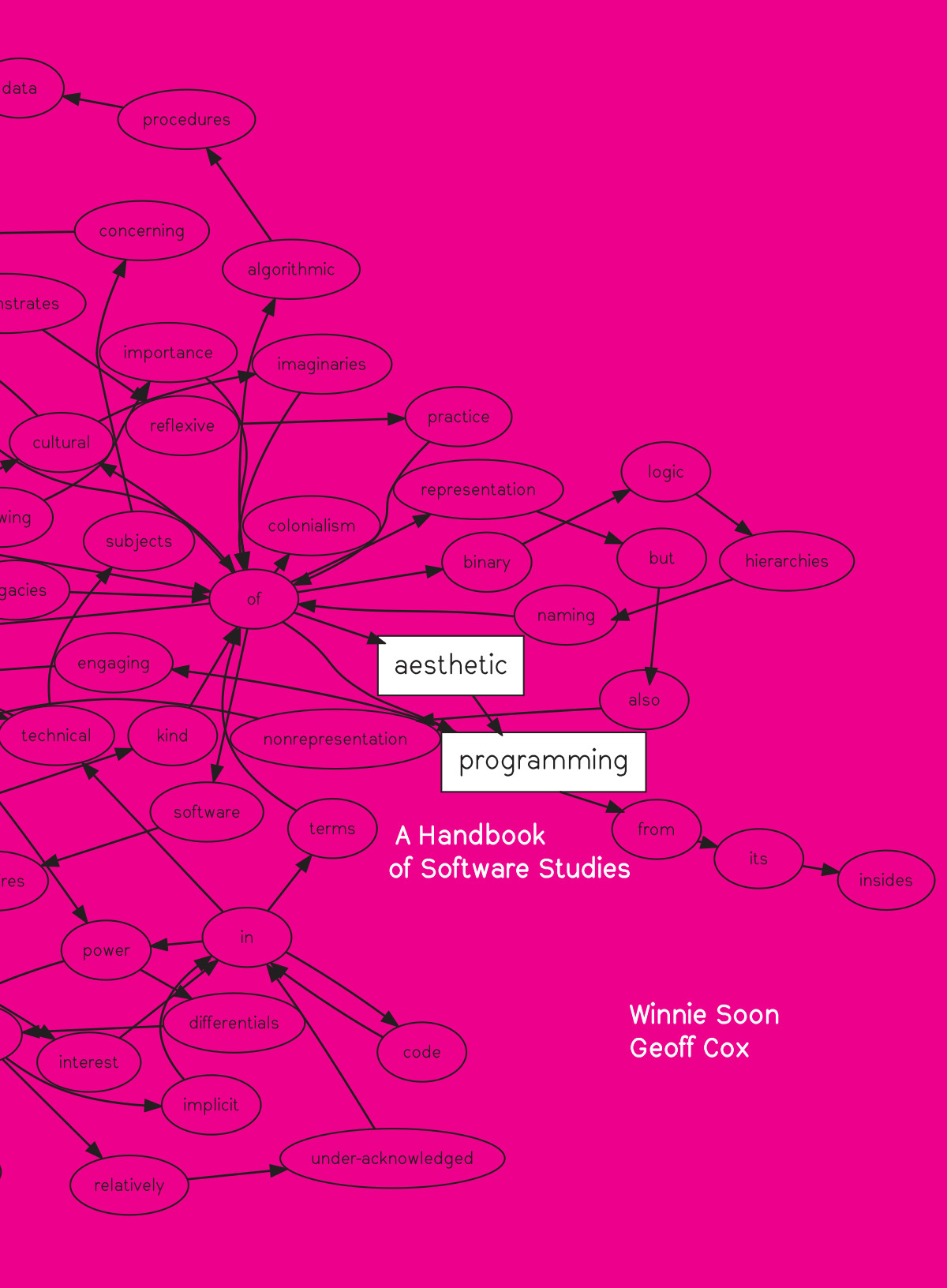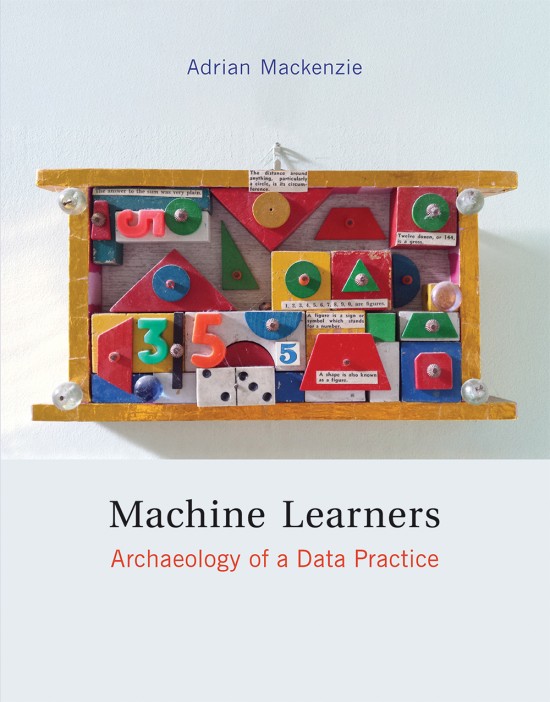Winnie Soon, Geoff Cox: Aesthetic Programming: A Handbook of Software Studies (2020)
Filed under handbook | Tags: · aesthetics, algorithm, code, computation, data, programming, software, software studies

“Aesthetic Programming explores the technical as well as cultural imaginaries of programming from its insides. It follows the principle that the growing importance of software requires a new kind of cultural thinking — and curriculum — that can account for, and with which to better understand the politics and aesthetics of algorithmic procedures, data processing and abstraction. It takes a particular interest in power relations that are relatively under-acknowledged in technical subjects, concerning class and capitalism, gender and sexuality, as well as race and the legacies of colonialism. This is not only related to the politics of representation but also nonrepresentation: how power differentials are implicit in code in terms of binary logic, hierarchies, naming of the attributes, and how particular worldviews are reinforced and perpetuated through computation.
Using p5.js, it introduces and demonstrates the reflexive practice of aesthetic programming, engaging with learning to program as a way to understand and question existing technological objects and paradigms, and to explore the potential for reprogramming wider eco-socio-technical systems. The book itself follows this approach, and is offered as a computational object open to modification and reversioning.”
Publisher Open Humanities Press, 2020
Creative Commons BY-SA License
ISBN 9781785420948
293 pages
Review: David Young (Computational Culture, 2021).
PDF, PDF
HTML (added on 2021-6-8)
Git
The Techno-Galactic Guide to Software Observation (2018)
Filed under book | Tags: · agility, art, code, compilation, design, free software, interface, productivity, software, software studies, time, touch

“This techno-galactic software survival guide was collectively produced as an outcome of the Techno-Galactic Software Observatory (Brussels, 2017). This guide proposes several ways to achieve critical distance from the seemingly endless software systems that surround us. It offers practical and fantastical tools for the tactical (mis)use of software, empowering/enabling users to resist embedded paradigms and assumptions. It is a collection of methods for approaching software, experiencing its myths and realities, its risks and benefits.”
With contributions from Manetta Berends, Željko Blaće, Larisa Blazic, Freyja van den Boom, Anna Carvalho, Loup Cellard, Joana Chicau, Cristina Cochior, Pieter Heremans, Joak aka Joseph Knierzinger, Jogi Hofmüller, Becky Kazansky, Anne Laforet, Ricardo Lafuente, Michaela Lakova, Hans Lammerant, Silvio Lorusso, Mia Melvaer, An Mertens, Lidia Pereira, Donatella Portoghese, Luis Rodil-Fernandez, Natacha Roussel, Andrea di Serego Alighieri, Lonneke van der Velden, Ruben van de Ven, Kym Ward, Wendy Van Wynsberghe, and Peter Westenberg.
Compiled by Carlin Wing, Martino Morandi, Peggy Pierrot, Anita Burato, Christoph Haag, Michael Murtaugh, Femke Snelting, and Seda Gürses
Publisher Constant, Brussels, 2018
Free Art License 1.3
ISBN 9789081145961
244 pages
Publisher
Project folder
Event
PDF, PDF (44 MB)
HTML (different version)
Git
Adrian Mackenzie: Machine Learners: Archaeology of a Data Practice (2017)
Filed under book | Tags: · abstraction, algorithm, archaeology, artificial intelligence, code, data, diagram, error, information science, information theory, knowledge, machine learning, mathematics, neural networks, programming, theory

“If machine learning transforms the nature of knowledge, does it also transform the practice of critical thought?
Machine learning—programming computers to learn from data—has spread across scientific disciplines, media, entertainment, and government. Medical research, autonomous vehicles, credit transaction processing, computer gaming, recommendation systems, finance, surveillance, and robotics use machine learning. Machine learning devices (sometimes understood as scientific models, sometimes as operational algorithms) anchor the field of data science. They have also become mundane mechanisms deeply embedded in a variety of systems and gadgets. In contexts from the everyday to the esoteric, machine learning is said to transform the nature of knowledge. In this book, Adrian Mackenzie investigates whether machine learning also transforms the practice of critical thinking.
Mackenzie focuses on machine learners—either humans and machines or human-machine relations—situated among settings, data, and devices. The settings range from fMRI to Facebook; the data anything from cat images to DNA sequences; the devices include neural networks, support vector machines, and decision trees. He examines specific learning algorithms—writing code and writing about code—and develops an archaeology of operations that, following Foucault, views machine learning as a form of knowledge production and a strategy of power. Exploring layers of abstraction, data infrastructures, coding practices, diagrams, mathematical formalisms, and the social organization of machine learning, Mackenzie traces the mostly invisible architecture of one of the central zones of contemporary technological cultures.
Mackenzie’s account of machine learning locates places in which a sense of agency can take root. His archaeology of the operational formation of machine learning does not unearth the footprint of a strategic monolith but reveals the local tributaries of force that feed into the generalization and plurality of the field.”
Publisher MIT Press, November 2017
ISBN 9780262036825, 0262036827
272 pages
via A.B.
Review: Graham White (Computational Culture, 2021)
PDF (removed on 2018-8-20 upon request from publisher)
Draft and code samples on GIT

